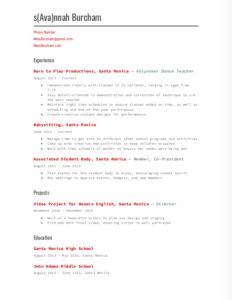Originally Posted Here
Sometimes it can be really hard to fill out a resume when you’re applying for your first position. It begs the horrible, paradoxical question: how are you supposed to get experience if you haven’t had a job? What is a resume with no experience?
It can be a frustrating piece of the employment puzzle, you don’t want to (and shouldn’t) lie, but you need this position. So, how do you make use of other parts of your life to fill out your resume honestly, while still making it enticing to potential employers? There are a few things you can do.
- Volunteer experience: This is probably the ideal thing to include if you don’t have any “real” experience. Volunteering often provides you with experience of working on a team, working under a boss, and with “customers,” and all of these things can and should be included and spoken about on a resume.
- School clubs or teams, or extracurriculars: Again, in these types of situations there are often dynamics at play that are similar to those you’ll find in a job position. If you’re the president of a club or a specific role on a team, you can talk about the things you do in those positions and how they’re applicable to your desired field.
- “Fake” jobs like babysitting or dog walking: Sometimes we might feel sort of embarrassed listing things that don’t feel like “real” jobs or positions (I definitely was), but you gain some really important skills from these “fake” positions that we give ourselves. Things like babysitting or dog-walking foster a self-starting attitude, and give you skills such as self-marketing and time-management.
- School projects or assignments: More and more often, school projects are designed purposefully to give you a taste of the “real world,” with students’ resumes in mind. So, include that project that you learned a lot on. It could showcase your teamwork, your ability to meet deadlines, your research capabilities, and any number of other things based on what the project was about and what job you’re applying for. You’ll probably want to put this in a “Projects” section of your resume, rather than “Work Experience” but it’s still good to include.
With each of the above options, you should be writing the responsibilities you had in terms of how they apply to the jobs you’re looking to get. Furthermore, make sure to include the location of the position, and the time frame you were involved in the activity. There are also some other, non-work, things you can include on a resume:
- Full name (definitely do this)
- Phone number (definitely do this)
- Email (definitely do this, and make sure you actually check your email)
- Education with location and graduation year (GPA optional)
- Some applicable classes you’ve taken
- Social profiles (if applicable/safe)
- Skills (programs you’re familiar with, job-relevant abilities)
- Languages you speak
- Interests
WRITING THE RESUME WITH NO EXPERIENCE
On top of just including the above things, the actual act of writing and formatting your resume can also be frustrating. There are a few things you should keep in mind while making your resume.
- You can get great, editable templates on Google Docs or Canva
- Write responsibilities you’ve had in terms of skills you’ve gained, in concrete, result-oriented language (numbers are great)
- Within bullet points, you normally don’t use periods at the end of the sentence, but use other punctuation and grammar as per usual
- Keep each bullet points limited to one sentence/idea
- Write bullets for past experience in past tense, write current experience in present tense
- Usually you put your experience in descending order of start date (newest to oldest), but you could also put things in most to least applicable to the job you’re applying for
- Usually resumes, especially when you don’t have much experience, are supposed to stay on one page, but they can go longer (and, counter to folklore, most hiring managers take more note of two-paged resumes)
Here’s an example of what this can all look like (with roughly the experience I had when I applied for my first job), on a resume format from Google Docs.

Overall, it can feel sort of weird to have to fill out a resume when you haven’t had a job before, but you shouldn’t discredit the experiences you have had, and the skills you’ve gained from them. It won’t get you a C-level position, but it can get you a job that can put you on that path.